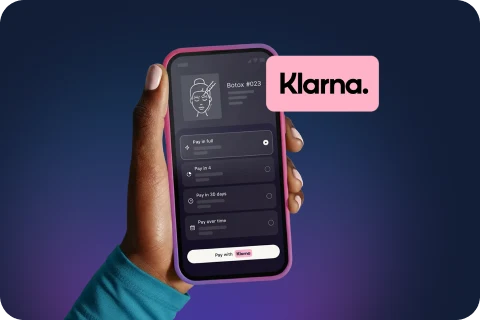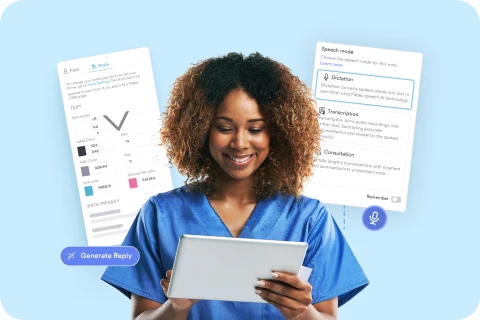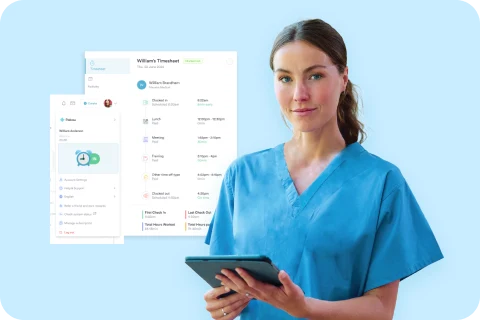Hiring an LPN who leaves after a few months — or worse, one who lacks the essential skills your practice or med spa relies on — is a costly mistake.
You need someone who’s in it for the long haul.
That’s why a thorough interview process that will help you vet the strongest candidates is a must to find the right LPN fit for your business.
It’s not quantum physics — you just have to have the right questions and a clear idea of what kind of answers you should expect from an experienced candidate.
We’re ready to help. 🕵️
Qualities to look for in an LPN candidate during the interview process
When interviewing candidates for a Licensed Practical Nurse (LPN) position, it’s important to evaluate both their technical and interpersonal skills.
Yes, formal training and certifications are essential, but an experienced LPN should also have qualities that contribute to client experience and teamwork.
Here are some key traits you should look for during the job interview:
- Clinical expertise — Proficiency in monitoring vital signs, safe injection and medication administration, wound care, catheterization, etc.
- Patient assessment — Ability to recognize changes in a patient’s condition, report concerns, and take appropriate actions.
- Communication skills — Strong verbal and written communication skills for coordinating with patients, families, and healthcare teams.
- Effective record keeping and documentation — Creating and updating medical client records and following healthcare regulations, such as HIPAA.
- Being compassionate — Having a caring and empathetic approach to supporting patients’ physical and emotional well-being.
- Time management and adaptability — Being able to handle multiple patients, prioritize tasks efficiently, and work in a fast-paced environment.
- Knowledge of safety protocols — Following proper sanitation, hand hygiene, and isolation precautions to prevent the spread of infections.
- Teamwork and collaboration — Ability to work alongside MDs, RNs, and other co-workers to ensure coordinated and effective patient care.
By focusing on these core qualities, you increase your chances of hiring an LPN who excels in both technical skills and patient-centered care.
11 interview questions to ask LPN candidates
To help you find the best fit for your team, we’ve compiled 11 essential LPN interview questions designed to identify the key qualities of a top candidate.
This guide will help you vet and hire a skilled, compassionate, and reliable nurse who will contribute to your practice or medical spa’s long-term success.
1. Tell me about yourself and why you become an LPN
This open-ended question is a great one to open the interview with. It helps candidates loosen up before you dig into slightly tougher topics later on.
Plus, it can also provide a great insight into their background, strengths, and passion for nursing. For instance, according to a survey, 79% of nurses say they would pick the same profession if they had to choose their career again.
You want an LPN in that passionate 79%, not the other 21%.
A strong response should include details about the candidate’s education, the nursing school they attended, licenses, and the courses they completed.
It should also highlight their professional experience and motivation for becoming a nurse.
A weak response will lack details and enthusiasm.
For example, simply stating the number of years working as an LPN without elaborating on education, skills, or motivation won’t provide meaningful insights into the candidate’s background.
2. Tell me about your experience working in a healthcare setting
The answer to this question will help you assess the candidate’s practical experience and their ability to navigate different clinical environments.
A good response should include specific details about the types of healthcare facilities they’ve worked in, the responsibilities they’ve handled, and their collaboration with registered nurses (RNs) and other healthcare professionals.
A poor response, such as “I’ve worked in many different healthcare settings over the past two years,” is too vague and may raise concerns about frequent job changes or lack of commitment.
3. Why do you want to work here?
This question determines if the candidate’s skill set, values, and career goals align with the job duties, company culture, mission, and vision.
You also want to see that they’ve done their research on your business — it shows that they’re prepared and think they’re a good match. If they can call out specific points about your ethos or brand, you know you’re onto a good one.
Good answer: “I’ve followed your business for a while. I admire the practice’s commitment to patient-centered care and would love to contribute to the team.”
Poor answer: “I love that the team is made up of people my age.” (This response focuses on social aspects rather than professional growth or patient care.) If they can’t give any specific reasons, that’s also pretty weak.
4. What qualities make a successful LPN?
This question reveals whether the candidate understands what it takes to excel in the role.
An experienced LPN will know that a good answer should include qualities such as:
- Expertise in providing high quality care
- The ability to follow instructions
- Excellent record-keeping skills
- Compassion and empathy
- Detail-oriented
- The ability to work well under pressure
A candidate who doesn’t mention any of these key qualities or responds with something vague may indicate a lack of relevant experience or understanding of the role’s requirements.
5. Describe a situation where you had to think critically and make a quick decision about a patient's care
Asking scenario-based questions is a great tool for hiring managers to assess a candidate’s critical thinking, decision-making skills, and ability to work under pressure. You want to know that they can think on their feet!
A strong answer should demonstrate the candidate’s potential to think quickly and take action when necessary. For example, describing a situation where they identified a problem, made a decision, and communicated effectively with the team shows their ability to manage high-stress situations.
A weak answer, such as “I can’t think of any situation at the moment but I usually wait for the RN’s instructions,” may indicate a lack of experience or confidence in making decisions independently.
6. What strengths do you bring to the LPN role that will support our team?
This question will highlight the candidate’s specific skills, the strengths they’re most proud of, their experience, and personal qualities that align with the role.
A well-thought-out answer should include qualities like:
- Being able to anticipate patient needs — You want someone who prioritizes and champions high-qulaity patient care
- Ability to make quick and informed decisions — Important for handling emergencies and critical situations confidently and safely
- A good team player — There’s no ‘i’ in team, so the saying goes. You need all your staff to be able to work together effectively.
- Reliability — Ensuring consistency in patient care and team support
- Technical proficiency — Experience using practice management software or electronic medical records (EMR) systems
A poor answer, for example, would be claiming that they don’t need help from others or that they can make decisions independently without consulting their team. A LPN will need to work with MDs, RNs, and other professionals. This signals a lack of openness to teamwork and further skill development.
7. Tell me about a time when you took initiative at work without being asked
Recruiters want to look for a proactive candidate who takes action without always waiting for their superior’s instructions. By asking this question, you can assess the candidate’s proactivity and leadership potential.
Good answer: “After a chemical peel treatment, I noticed a patient had more redness and swelling than I’d normally expect, even though they’d been screened for allergies beforehand. I took the initiative to check in with the patient, assess their symptoms, and inform the RN immediately.
We adjusted the postcare plan and offered soothing treatments. This proactive response ensured the patient felt supported and reassured.“ (This response shows attentiveness, responsibility, and a proactive mindset.)
Poor answer: “I only do what I’m assigned.” (This suggests a lack of initiative and willingness to go beyond basic job duties.)
8. How would you handle a situation where you disagree with your RN's recommendation?
Being able to navigate professional disagreements respectfully and collaboratively is not something everyone can do. The answer you’ll get will help you evaluate the candidate’s professionalism and stakeholder management skills.
A strong candidate wouldn’t simply follow instructions without question. Instead, they would respectfully voice their concerns by stating the facts, seek clarification, and ensure patient safety before proceeding.
On the other hand, a less experienced candidate might hesitate to speak up and simply follow directions without asking questions, which could indicate a lack of confidence or critical thinking skills.
9. How would you respond to concerns raised by a patient’s family about their care?
In healthcare, LPNs frequently interact with patients’ families.
So, the answer to this question will help you assess the candidate’s communication skills and ability to handle sensitive situations.
A strong response should highlight active listening, empathy, and reassurance. A good candidate would acknowledge the family’s concerns, reassure them that their family member is receiving quality care, and communicate any important issues to the RN if necessary.
Poor answer: “I would tell them that it’s best to talk with the RN.” (An answer like this suggests a lack of initiative and confidence in themselves, which could negatively impact patient trust and satisfaction.)
10. Have you used practice management software at previous clinics?
An experienced LPN should be comfortable navigating electronic health records (EHR) or other practice management systems, such as Pabau, Zanda Health, Semble, and others, to ensure efficient workflow and accurate documentation.
If the candidate lacks direct experience, their willingness to learn and adapt to new technology is equally important.
A strong answer will include specific tasks the candidate has completed using the software. For example, if the candidate has worked with Pabau, they might mention how they used it to manage tasks such as:
- Managing patient records
- Scheduling appointments
- Assisting with billing tasks
- Ensuring accurate record-keeping and documentation
- Sending automated appointment reminders and follow-ups
A weak answer, such as stating a preference for keeping client records on paper, could signal a lack of technical skills and an unwillingness to adapt to modern healthcare tools that help teams work more efficiently.
11. What is the most challenging part of being an LPN?
There are difficult parts in every job. This question provides insights into the candidate’s self-awareness and resilience in facing challenges within the role.
A strong answer will acknowledge real challenges, such as managing time effectively during busy shifts or balancing the emotional aspects of patient care, while also highlighting strategies for overcoming them.
A poor answer, such as stating “Dealing with difficult patients,” may suggest a limited understanding of the diverse challenges LPNs face.
Additional questions to ask
Interviews can take different directions depending on the candidate, so it’s important to be flexible and prepared with additional questions.
Having some extra questions ready will help you make the most of the interview, regardless of where the conversation goes.
- What steps do you take to prevent medication errors?
- How do you stay updated on healthcare best practices?
- How would you handle a non-compliant patient?
- What would you do if you were asked to do something that didn’t fall under your remit as an LPN?
- Have you ever made a mistake concerning a patient, and how did you resolve it?
- What do you find most rewarding about being an LPN?
- What are your salary expectations?
Questions LPN candidates may ask interviewers
A well-prepared LPN candidate will likely have a question or two for the recruiting manager.
So, when responding, be transparent about expectations, support systems, and opportunities for growth within your practice.
Here are some common questions you should be prepared to answer:
- What is the typical patient-to-nurse ratio in your practice? — You should provide a clear explanation of staffing levels and how patient care is managed.
- What are the main challenges LPNs face here? — The answer should highlight specific obstacles, such as operational challenges or high client expectations. Be honest about what to expect, but fair.
- What are the everyday responsibilities of an LPN in this practice? — The response should provide a detailed description of the LPN’s role, including duties, patient care tasks, and any other expectations.
- What are the opportunities for professional growth? — Share any specifics about training or nursing career development opportunities in the practice.
- What is the work culture like? — The answer should give candidates insight into the workplace environment and values.
- Which practice management software do you use? — Clarify the specific software you use and whether training will be provided.
- What is the training and onboarding process like? — Give details about initial training and mentorship that will help them prepare for the role.
- What shift schedules are available? — The answer should provide clear details about what shifts they’d be expected to work, including regular hours, weekend and night shifts, or any on-call responsibilities.
Manage and onboard your staff with Pabau
Once you’ve selected the right LPN candidate for your team, the next step is ensuring a smooth hiring, onboarding, and ongoing management process.
A well supported team performs best, but only with the right tools.
Pabau, our all-in-one practice management software, helps healthcare organizations streamline patient care, manage bookings and scheduling, handle all your social media marketing for medical practice from one system, and compliance management.
It can help you manage your team by:
- Reducing the administrative burden
- Simplifying scheduling and rota management
- Timesheets and clock-in/clock-out functionality
- Robust permissions settings to protect patient data
- Commission tools to motivate your staff
So book a demo today and learn all the things Pabau can do for your practice.









